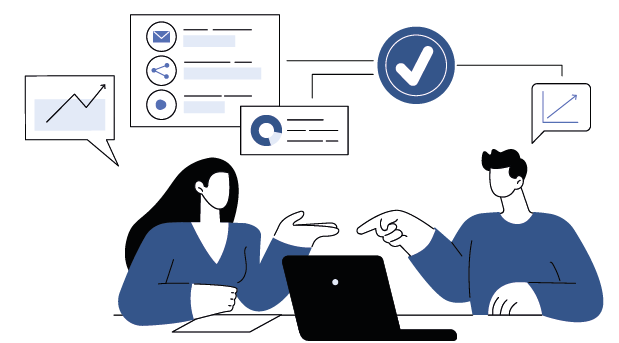Why is your strategic plan bound to change over the course of its implementation?
Defining and executing corporate strategy is a dynamic process that requires constant adaptation to meet changing market challenges and opportunities. A strategic plan is not a static document, but rather a living guide that must evolve as it is executed. In this article, we’ll explore why your strategic plan is bound to evolve over the course of its implementation.

-
The market context is constantly changing
The market in which your organisation operates is constantly changing. Market trends, consumer behaviour, competition, technology, regulations and other external factors are constantly changing. These changes can have a significant impact on your business and require you to continually adapt your strategy.
For example, the arrival of a new competitor on the market may require a change in your pricing or differentiation strategy. Similarly, a new technology may create opportunities for new products or services, or render your current offerings obsolete. A change in regulation may open up new markets or close others.
To remain competitive, your company must constantly monitor the market environment and adjust its strategy accordingly. This may mean changes to your product strategy, market strategy, pricing strategy, distribution strategy, communication strategy, etc.
-
Strategic assumptions may turn out to be incorrect
When you draw up your strategic plan, you make certain assumptions about the market, customers, competitors, technology, etc. These assumptions form the basis of your strategy. These assumptions form the basis of your strategy. However, some of these assumptions may prove to be incorrect as the strategy is implemented.
For example, you may assume that customers will value a certain feature of your product, but later discover that they do not. Or you may assume that you can achieve a certain level of productivity or efficiency, but encounter unforeseen obstacles that make that goal unattainable.
When strategic assumptions turn out to be incorrect, you need to revise your strategy. This may mean reviewing your objectives, your market targets, your value proposition, the resources involved, your tactics, etc.
-
Learning and innovation require adaptation of strategy
Strategy execution is a learning process. As you implement your strategy, you learn what works and what doesn’t, what customers like and don’t like, what unforeseen challenges and opportunities exist, and so on.
This learning must be integrated into your strategy. You need to be prepared to adjust your strategy based on what you learn. This may mean making minor adjustments to improve efficiency, or major changes to capitalise on new opportunities or respond to new challenges.
What’s more, innovation is a key element of business strategy. To remain competitive, your company must constantly innovate, whether in terms of products, services, processes, business models, etc. Innovation requires experimentation, learning and adaptation, which means that your strategy must evolve to incorporate and support innovation.
-
Company resources and capabilities evolve
Your company’s resources and capabilities are not static; they evolve over time. You can acquire new resources, such as assets, technologies, skills and so on. You can develop new capabilities, such as the ability to serve new markets, to use new technologies, to innovate, and so on.
These changes in resources and capabilities can create new strategic opportunities. For example, acquiring a new technology may enable you to develop new products or improve the efficiency of your operations. Developing a new capability may enable you to enter new markets or better serve your existing customers.
To capitalize on these opportunities, you also need to adapt your strategy. This may mean reviewing your product strategy, market strategy, skills strategy, etc.
-
Stakeholder expectations are changing
The expectations of your stakeholders – customers, employees, shareholders, partners, the community, etc. – can change over time. – can change over time. These changes may require you to adapt your strategy.
For example, customers may start to value sustainability more, which requires a more sustainability-focused strategy. Employees may demand a better work-life balance, requiring a strategy that supports this new balance. Shareholders may demand higher returns, which requires a strategy that maximises profitability.
To meet these changing expectations, you need to be prepared to adjust your strategy. This may mean reviewing your value proposition, your corporate culture, your business model and so on.
In conclusion, your strategic plan is bound to evolve over the course of its execution. The market, assumptions, learning, resources, capabilities and stakeholder expectations are constantly changing, and your strategy needs to adapt to these changes. A flexible and adaptable strategy is a key to success in today’s dynamic and uncertain business world.

